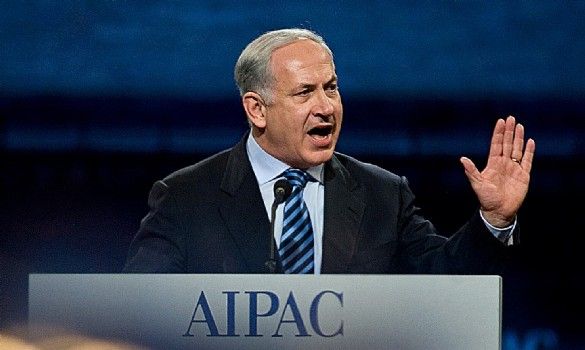– More than 250 Congress members declare commitment to ‘unbreakable’ U.S.-Israel bond (Haaretz)

The President was said to have walked out of the meeting, saying to Mr Netanyahu: ‘Let me know if there is anything new’ (AP)
For a head of government to visit the White House and not pose for photographers is rare. For a key ally to be left to his own devices while the President withdraws to have dinner in private was, until this week, unheard of. Yet that is how Binyamin Netanyahu was treated by President Obama on Tuesday night, according to Israeli reports on a trip viewed in Jerusalem as a humiliation.
After failing to extract a written promise of concessions on settlements, Mr Obama walked out of his meeting with Mr Netanyahu but invited him to stay at the White House, consult with advisers and “let me know if there is anything new”, a US congressman, who spoke to the Prime Minister, said.
“It was awful,” the congressman said. One Israeli newspaper called the meeting “a hazing in stages”, poisoned by such mistrust that the Israeli delegation eventually left rather than risk being eavesdropped on a White House telephone line. Another said that the Prime Minister had received “the treatment reserved for the President of Equatorial Guinea”.
Left to talk among themselves Mr Netanyahu and his aides retreated to the Roosevelt Room. He spent a further half-hour with Mr Obama and extended his stay for a day of emergency talks to try to restart peace negotiations. However, he left last night with no official statement from either side. He returned to Israel yesterday isolated after what Israeli media have called a White House ambush for which he is largely to blame.
Sources said that Mr Netanyahu failed to impress Mr Obama with a flow chart purporting to show that he was not responsible for the timing of announcements of new settlement projects in east Jerusalem. Mr Obama was said to be livid when such an announcement derailed the visit to Israel by Joe Biden, the Vice-President, this month and his anger towards Israel does not appear to have cooled.
Robert Gibbs, the White House press secretary, cast doubt on minor details in Israeli accounts of the meeting but did not deny claims that it amounted to a dressing down for the Prime Minister, whose refusal to freeze settlements is seen in Washington as the main barrier to resuming peace talks.
The Likud leader has to try to square the rigorous demands of the Obama Administration with his nationalist, ultra-Orthodox coalition partners, who want him to stand up to Washington even though Israel needs US backing in confronting the threat of a nuclear Iran.
“The Prime Minister leaves America disgraced, isolated and altogether weaker than when he came,” the Israeli daily newspaper Haaretz said.
In their meeting Mr Obama set out expectations that Israel was to satisfy if it wanted to end the crisis, Israeli sources said. These included an extension of the freeze on Jewish settlement growth beyond the ten-month deadline next September, an end to building projects in east Jerusalem and a withdrawal of Israeli forces to positions held before the second intifada in September 2000.
Newspaper reports recounted how Mr Netanyahu looked “excessively concerned and upset” when he pulled out a flow chart to show Mr Obama how Jerusalem planning permission worked and how he could not have known that the announcement that hundreds more homes were to be built would be made when Mr Biden arrived in Jerusalem.
Mr Obama then suggested that Mr Netanyahu and his staff stay at the White House to consider his proposals so that if he changed his mind he could inform the President right away. “I’m still around,” the daily newspaper Yediot Aharonot quoted Mr Obama as saying. “Let me know if there is anything new.”
With the atmosphere so soured by the end of the evening, the Israelis decided that they could not trust the telephone line they had been lent for their consultations. Mr Netanyahu and Ehud Barak, his Defence Minister, went to the Israeli Embassy to ensure that the Americans were not listening in.
The meeting came barely a day after Mr Obama’s health reform victory. Israel had calculated that he would be too tied up with domestic issues to focus seriously on the Middle East.
Giles Whittell, Washington, and James Hider, Jerusalem
March 26, 2010
Source: The Times